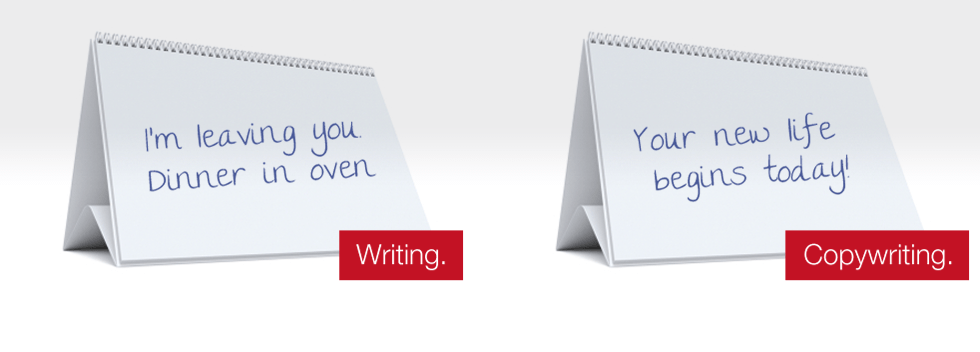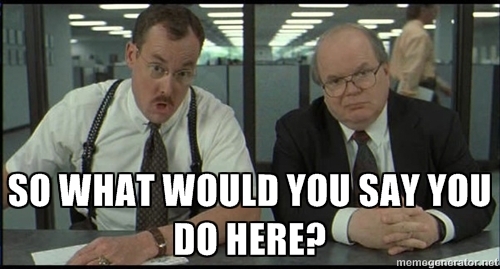When many fiction writers hear I write marketing and advertising copy for a living, they’ll inevitably ask, “Isn’t it hard to write corporate copy all day and fiction all night? Aren’t you burned out by the time you get home?”
Folks generally tell me the story of a web designer or illustrator who’s so burned out after working on corporate projects all day that they don’t have the headspace to work on personal projects. But for me, corporate copywriting and writing novels are very, very different pursuits. They use entirely different parts of my brain. Corporate copywriting tends to be far more analytical – I’m not asking what I want, I’m not pulling fantastic stuff from the air; I’m asking what will appeal to a particular audience, and balancing that with the requirements the client has given me for a specific piece. Contrast this with novels, which are mine from start to finish. There’s no endless rounds with stakeholders. It’s not copy by committee. The suggested edits from your agent, your editor, your copyeditor, are just that. There is no client with a red pen who has the final say. What you write is what you own is what goes out the door.
Corporate work, by contrast, will sometimes go out the door resembling some mutant freak food, not the funny little treasure you originally penned.
That said, you can pick up a lot of skills as a corporate copywriter that serve you well with novels. I’d go so far as to say that you can often tell the difference between a novelist who’s worked for hire and a novelist who hasn’t purely in how they respond to reviews, feedback, business concerns, and deadlines. I was talking about just such a thing recently with some other writers who had worked extensively in corporate copywriting and other types of writing work outside of publishing. And the consensus was that OH DEAR GOD TALKING TO NOVELISTS WHO DID NOT WORK FOR HIRE OMG THEY LIVE IN ANOTHER UNIVERSE HOW DO THEY SURVIVE? (the answer is often: they don’t. Or, they had a book or series that was so got-lucky successful they never had to learn)

So somebody on Goodreads says they didn’t like your book. So what? I once had a client email me feedback on a project that was (and yes, this is a direct quote), “This copy is just a jumble of words.” This was somebody I had to work with in order to keep the lights on. I was so angry I had to get up from my desk and take a walk around my work campus before I came back to untangle what exactly “jumble of words” meant to this client so we could make it more like what they wanted. I’ve won awards for my fiction, sure, but I’ve won awards for my corporate work too, and having someone ten years your junior tell you you’re incompetent, and then you’re nodding and smiling and revising it to their specifications, is just a part of the job. Do you like to eat? I like to eat.
So a conservative writer says you’re a mealy-mouthed hack of a liberal and you have to sit down to a group dinner with him at a convention? Try having a client tell your boss you’re an worthless, unpleasant hack, and then find yourself required to sit down with that person in every single project meeting forever after, where you have to laugh and joke and dutifully write down their direction for a new projects. And then you must deliver them your best work with no fuss, no sarcasm, no guff. You suck it up. Because you’re a professional.
So your book is due in a month. That’s tough. Try the valuable client who keeps your entire agency afloat who needs four creative concepts by 8 a.m, and it’s already 4:30 p.m., or the big web sales project that has to go up by midnight because it kicks off the entire sales season for your company, and you’re up at 11:30 p.m. emailing the President, the CEO and the VP of Marketing to get endless edits and sign-off on hastily rewritten copy.
The truth is, the most mind-numbing, exhausting job I ever had had nothing to do with writing. It was when I worked as a project assistant at an architectural firm, and 80% of my job was updating project spreadsheets. Yes, spreadsheets. I added and changed dates as projects were completed or pushed out. I commuted three hours every day. Yes, that’s 15 hours of commuting time a week, and then they started flying me out to another city once a month to update spreadsheets there, too (Yeah, I know. “Face time” was important, I guess?). That job wrecked me for writing. Even during slow times at that day job, I didn’t have the energy or focus to work on my own writing projects during the lull. I ended up reading blogs and making Neverwinter Nights modules instead.
Being a corporate copywriter teaches you that writing is a job – it has deadlines that can get you fired if you don’t meet them. It forces you to work with people who really don’t like you, or who view you as some kind of word computer, some non-sentient being that just craps out words when provided with the right stimulus. You also get really used to being taken for granted. I’m reminded, often, of Peggy Olsen, the crackerjack copywriter in Mad Men, yelling at her boss about how she works incredibly hard for him and he hasn’t said one word of thanks or encouragement and he yells, “That’s what the money’s for!” You are paid for a service. If you expect glowing reviews or fabulous friendships, you should find another profession.
Corporate copywriting does pay well, the longer you do it. Far better than novel writing. But as the examples above illustrate, the burnout rate can be very high, depending on what type of work environment you land in. You’d think being a game writer would be fabulous 24/7 fun, too, but at the end of the day, you’re working for a corporation with release dates and deadlines, just like at any other corporation. You learn to write to a deadline, within the parameters of the story set down by your team, or you go home.
It’s this idea, that writing is a job, a business, that I so often take for granted when talking to other novelists. It’s why I’m often brought up short when I hear writers tell me a book was due in a year but takes five years. Or when I see SFF authors descend into high school theater style “I hate you for that comment that one time! That person hates me for that post! So-and-so loves such-and-such! Here’s who’s on this side!” politics. I mean, c’mon, who cares? In 90% of cases, the folks you interact with at conventions are your business colleagues, not your friends. If they are your friends, you better be seeing each other a lot outside conventions, sharing baby and dog pictures regularly, and occasionally weeping onto their shoulder about various relationship problems. If not, you’re probably not friends. You are work colleagues. Act like it.
I’ve also found myself confused a lot by writers’ indifference to the business side of writing and publishing. I negotiate my salary and work conditions at my day job. I should be negotiating my novel contracts, too. I’m aware of the HR and benefit policies at my day job. I should be aware of the licensing and foreign rights management of my books. Right?
The most dangerous lie that writers are told is that novel writing is worthless, that it’s a “fancy,” that it’s somehow romantic or special because one often takes joy in doing it. The reality is that no middle man will buy your words if they don’t think they can make money from them. End of story. I’ve seen the analytics on how much money my words can make (and are making) the clients I work with, and trust me: it’s worth the rates I charge. It’s the same with my novels – I know about how much my publisher(s) are making on my books, and it’s enough that more people want books from me (but not enough for those fabled million dollar advance… YET!). Publishers are not working for free. They aren’t publishing you out of pity, any more than your boss is hiring you to write copy out of pity. They are here to make money. If they offer you a contract, it’s because they believe they can profit from it (and, in many instances, sure, it means they like what you write, but that’s an aspect to why your corporate boss hires you, too. They like it insofar as it’s good for the company).
I worry a lot about other writers’ approach to being a novelist. I have to keep in mind, often, that many writers are playing a different game than I am. They are not here to be career novelists. They are here to write weird books, or pretty books, or win awards, or sell X amount of copies, or make X amount of money. And all those reasons for writing, all those different paths, will have a different game plan. A different approach. Your approach is going to depend entirely on why exactly you’re in this game. The sooner you figure that out, the sooner you know what career you want, the better. Because let me tell you – there are a million ways to hack this business depending on what your goals are, and a trillion ways to fail at every single one of those goals an endless number of times.
I write copy to keep the lights on, sure. But I also write corporate copy because I enjoy the challenges. I like the idea of tapping into the hopes, dreams and desires of an audience to position products. That may not sound sexy until you realize that this type of persuasive advertising is how we change human behavior, too. It’s how we got people to smoke, and stop again. It’s how we got people to wear seat belts. To vaccinate children. To get flu shots. There is a tremendous amount of public good you can do if you know how to speak to audiences. If we’re selling widgets today, well, maybe tomorrow we’re selling universal healthcare, and I’ll have the tools at my disposal to do it.
In the meantime, corporate copywriting gives me the financial security that writing fiction doesn’t, right now. Fiction writing will be a forever feast-or-famine cycle. Even if you’re an author making great money, the amounts of “great” will vary wildly from year to year.
And maybe that’s the greatest thing writing corporate copy has taught me: it’s taught me not to quit my day job. Because the fiction market will always be more unpredictable than the corporate one. Because we will all buy stories that sell products in greater numbers than we will buy stories that challenge us to change the world.
And the world we publish in is changing far faster than we can type – I learned that doing corporate work, too.


